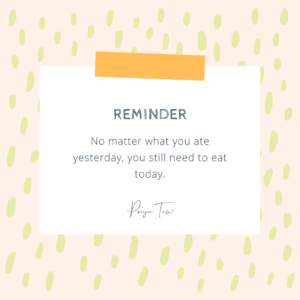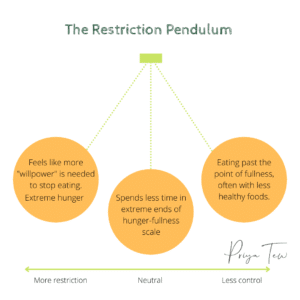No matter what you ate yesterday, you still need to eat today.

We all have days we eat differently, maybe you had a Saturday night takeaway, or ate your favourite comfort foods in front of the TV, all totally normal! However, sometimes the day after eating more high fat and sugary foods there can be a desire to compensate. Think about your thoughts the day after, what do your eating habits look like and do you have a compulsion to exercise the food off? If you experience feelings of guilt and a desire to restrict what you eat, you may be showing binge-restrict behaviours. This can be an indication that it is time to invest in your relationship with food and your body. Regardless of what you ate yesterday, you still need to eat today. It may be that you are a little less hungry, or naturally turn to different food, like vegetables. If that is what your body is telling you, no problem. But when you feel like you have to compensate for yesterday’s food, that can point to a larger issue.
Trying to stave off eating certain foods isn’t about willpower, it is in our biology. The longer you try to hold off from eating certain foods, the harder your body makes it to resist. Imagine holding a pendulum or elastic band to one side, winding tighter and tighter to try and gain control. When you eventually let go, that pendulum will swing way across to the other side, much further than if you hadn’t pulled it back so much. That is what it is like when you restrict food. Your body wants to be replenished and nourished, so will send you straight to the cupboards after having food withheld.

Although this binge-restrict cycle is not necessarily part of a clinically diagnosed binge eatThe dieting cycle.ing disorder, it is a behaviour that can seriously impact your mental wellbeing. If you do feel as though you may have an eating disorder, or are at risk of developing one then it is important to speak to a healthcare professional, or at least someone you trust who can look out for you. Get in touch for specialist dietitian support.
When it comes to nutrition, a “big picture” view can be helpful. One meal, one day and even several weeks or months are pretty insignificant over the course of our lives. Instead of allowing what you ate to cause guilt or trigger a cycle of restriction and overeating, try to step back and move on. Look at your next meal as an opportunity to nourish yourself rather than compensate for the previous one. One technique that you may find helpful, is to journal, or reflect how you feel after having what feels like a binge, or breaking your healthy diet. Sitting with an emotion can feel uncomfortable, but it can help you to process why you’re feeling the way that you do.
Treating yourself with compassion is important here. Whether restricting is an occasional thing, or if you feel as though you are caught in a cycle, you deserve kindness. Restriction can come from guilt and shame, which can harm your self image. Responding to a less healthy day of eating with kindness means acknowledging that your body will still need nourishment the next day. Let that binge-restrict pendulum settle back into an equilibrium by returning to your normal eating patterns rather than trying to compensate.
Huge thanks to Elle Coales for her help with this blog post.
Hi priya, can you recommend the right service for bulimia, food poverty history, food neglect, over eating, digestion issues, basically hate food. I also gave multiple diagnosis hypothyroidism hashitmotos, fibromyalgia and diabetes. And a possible wheat/ gluten intolerance!! Thanks.
Hi Julie, this is something I could work with you on, via 1-1 consultations over zoom. I’d also recommend some therapy to go alongside the nutrition work.